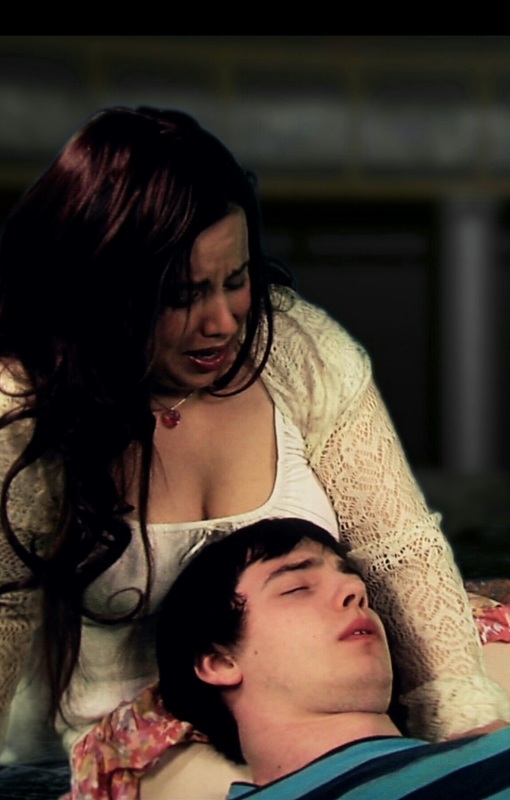For me, the key to making your characters believable is to care about them: invest in their lives as you would if they were your actual friends and family. Think about their hopes and aspirations, their deepest fears and insecurities, their strengths and weaknesses. This may sound a little off the wall but it does work.
When I started writing Eternal, the characters of Vala (my female protagonist), Elvar (my male protagonist) and Amalia (a fae spirit) formed almost instantaneously, with Jelly and Max (Vala’s friends) closely following. The characters took on a life of their own and the story just flowed.
Vala, my female protagonist, is ostensibly a younger version of myself, and Elvar, my male protagonist (and Vala’s love interest), possesses all the qualities of my ideal man. When I am writing, I am living vicariously through Vala, feeling her emotions and thoughts. I believe this really helps create an authenticity and realism that would not otherwise be there. Again, Vala’s relationship with her parents is similar to my own. However, her friends and the other characters are not directly based on real people – I just drew upon certain attributes and personality traits and the characters simply materialised; it was as though they already existed in some alter dimension, just waiting to be actualised as part of my story. The antagonist of Eternal, the Spindler, is an amalgamation of fear, nightmares, terror, and ancient evil, personified as a powerful adversary.
Because my female protagonist is essentially myself at seventeen, it is easy to cast my mind back to that time. Mentally and emotionally I still do not feel any older than I did at eighteen so this is not a difficult process for me. As the plot develops and a character is thrown into various situations, whether they be fantastical or ordinary, I imagine how I would respond and my character’s response reflects this. To do this it is imperative to completely immerse yourself in that character – shut out any external distractions, any unhelpful internal chatter – live and breathe what your character is experiencing – be in their world, not your own. Likewise with the other characters, if you have made them real, imagine how they would respond to your story’s scenarios and challenges – base this on their unique personas. It is paramount to give all characters, not just the protagonist(s) a background – a history; we are all a sum of our life experiences and genetic blueprint.
Another critical component to writing believable characters is their inter-personal relationships and interactions with the other characters. As I mentioned before, neither my male protagonist, Elvar, nor Vala’s friends are based on real people – however, I imagined them as though they were, giving them fully developed personalities and life histories. When they interact with each other, I am envisioning them as real people. As all dialogue is a written expression of your characters’ interactions, it is important to fully immerse yourself in the moment to make it real. With Eternal, Vala and Elvar’s relationship is woven into the central theme – the main essence of the story, so the believability factor truly determines the story’s success.
In my personal experience, developing the antagonist’s character, was a slightly different process. My antagonist’s provenance came from a piece of poetry I had written years earlier based on an early (and highly unpleasant) paranormal experience. The Spindler is an insidious, dangerous character – however, his conduct and speech patterns still reflect the fae world of which he is a part. He is much more of an enigma than the other characters as his origins are unknown so we do not, in the first instalment of my Eternal trilogy, find out his motivations and background. I believe a little mystery surrounding a character is absolutely fine – it creates intrigue as your reader will be itching to discover more.
To conclude, just write from the heart – whether you love or hate a character, it does not matter as long as you have a strong emotional response to them as indifference is a killer and will make your characters flat and dull, creating an uninspired story no matter how clever the plot. If your characters are believable, your story will come alive and be a delight to the reader.
When I started writing Eternal, the characters of Vala (my female protagonist), Elvar (my male protagonist) and Amalia (a fae spirit) formed almost instantaneously, with Jelly and Max (Vala’s friends) closely following. The characters took on a life of their own and the story just flowed.
Vala, my female protagonist, is ostensibly a younger version of myself, and Elvar, my male protagonist (and Vala’s love interest), possesses all the qualities of my ideal man. When I am writing, I am living vicariously through Vala, feeling her emotions and thoughts. I believe this really helps create an authenticity and realism that would not otherwise be there. Again, Vala’s relationship with her parents is similar to my own. However, her friends and the other characters are not directly based on real people – I just drew upon certain attributes and personality traits and the characters simply materialised; it was as though they already existed in some alter dimension, just waiting to be actualised as part of my story. The antagonist of Eternal, the Spindler, is an amalgamation of fear, nightmares, terror, and ancient evil, personified as a powerful adversary.
Because my female protagonist is essentially myself at seventeen, it is easy to cast my mind back to that time. Mentally and emotionally I still do not feel any older than I did at eighteen so this is not a difficult process for me. As the plot develops and a character is thrown into various situations, whether they be fantastical or ordinary, I imagine how I would respond and my character’s response reflects this. To do this it is imperative to completely immerse yourself in that character – shut out any external distractions, any unhelpful internal chatter – live and breathe what your character is experiencing – be in their world, not your own. Likewise with the other characters, if you have made them real, imagine how they would respond to your story’s scenarios and challenges – base this on their unique personas. It is paramount to give all characters, not just the protagonist(s) a background – a history; we are all a sum of our life experiences and genetic blueprint.
Another critical component to writing believable characters is their inter-personal relationships and interactions with the other characters. As I mentioned before, neither my male protagonist, Elvar, nor Vala’s friends are based on real people – however, I imagined them as though they were, giving them fully developed personalities and life histories. When they interact with each other, I am envisioning them as real people. As all dialogue is a written expression of your characters’ interactions, it is important to fully immerse yourself in the moment to make it real. With Eternal, Vala and Elvar’s relationship is woven into the central theme – the main essence of the story, so the believability factor truly determines the story’s success.
In my personal experience, developing the antagonist’s character, was a slightly different process. My antagonist’s provenance came from a piece of poetry I had written years earlier based on an early (and highly unpleasant) paranormal experience. The Spindler is an insidious, dangerous character – however, his conduct and speech patterns still reflect the fae world of which he is a part. He is much more of an enigma than the other characters as his origins are unknown so we do not, in the first instalment of my Eternal trilogy, find out his motivations and background. I believe a little mystery surrounding a character is absolutely fine – it creates intrigue as your reader will be itching to discover more.
To conclude, just write from the heart – whether you love or hate a character, it does not matter as long as you have a strong emotional response to them as indifference is a killer and will make your characters flat and dull, creating an uninspired story no matter how clever the plot. If your characters are believable, your story will come alive and be a delight to the reader.


 RSS Feed
RSS Feed
